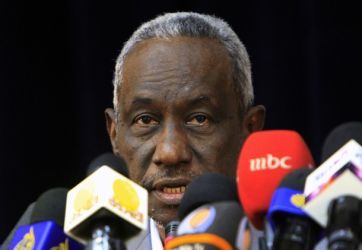Sudan’s former first vice-president misses NCP leadership meeting
December 29, 2013 (KHARTOUM) – The former Sudanese First Vice President, Ali Osman Taha, has not attended a five-hour regular meeting of the ruling National Congress Party’s (NCP) leadership office on Saturday.

The NCP’s deputy chairman for party affairs and official spokesperson, Ibrahim Gandour, justified in press statements on Saturday Taha’s absence from the important meeting saying that he is “busy”.
“I’m sure he is busy. The absentee must have his own excuse. I know he is interested in the party reform issues and continued to follow-up the work of the committee”, he continued.
Gandour wondered why people don’t ask when other leadership office members don’t attend meetings.
Earlier this month president Bashir announced cabinet shakeup that saw the departure of several long-time NCP figures from their governmental posts including former vice-president Ali Osman Taha, presidential assistant and NCP vice-chairman Nafie Ali Nafie and Oil minister Awad al-Jaz.
There were conflicting explanations given for the government shakeup. Some observers and media reports attributed the move to strong disagreements within the NCP and the government.
But Taha dismissed those claims, saying that the changes were in line with the NCP’s decision to implement a sweeping overhaul that included everyone.
Gandour disclosed that the meeting also discussed papers on economic reform and party reform including vertical and horizontal relations within the party and ways for activating Shura (consultations) mechanisms.
The NCP vice-chairman further said the meeting discussed papers on foreign relations and ways for reforming civil service. He pointed that recommendations on the economic performance were also presented including fiscal policies, economic planning, and boosting industrial and agricultural sectors.
He further pointed that the leadership office would return the papers to the reform committee and an implementation matrix will be developed for those papers in line with the outcome of the meeting.
(ST)
